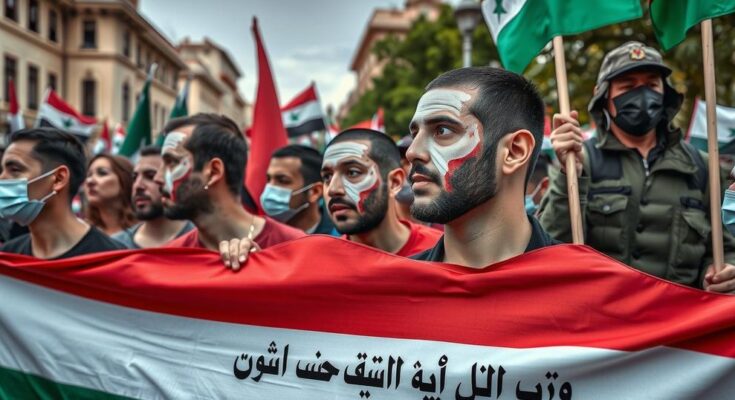On Sunday, protests in Tripoli, Lebanon, called for the release of Islamists detained due to their involvement in the Syrian civil war. Demonstrators argue that many were arrested for supporting anti-Assad forces. Prime Minister Najib Mikati has indicated the need for a resolution, pending parliamentary discussions regarding amnesty.
On Sunday, hundreds of demonstrators gathered in Tripoli, Lebanon, to advocate for the release of individuals who were imprisoned due to their involvement in the Syrian civil war. Many of these detainees are Lebanese citizens who crossed into Syria to engage with rebel factions opposing the regime of President Bashar al-Assad. The rally took place in Nour Square, coinciding with a significant shift in the Syrian political landscape following the recent overthrow of Assad’s regime.
Ahmad al-Shimali, a participant in the demonstration, emphasized the necessity of exerting pressure on Lebanese authorities to free those held based on their activities during the civil conflict. He stated, “Islamist detainees in Lebanon’s prisons were arrested in the context of the Syrian revolution,” pointing out that these individuals often sought to support their compatriots in Syria. He further noted, “Most went to Syria to fight, supported our people in Syria, or were found to have communicated with jihadists or fighters.” The protest underscores the ongoing conversation about justice and the political implications for those accused of extremist affiliations.
Human rights advocates have consistently called for due legal processes for individuals accused of Islamist connections, particularly given that some have languished in detention for extended periods without trial. Prime Minister Najib Mikati had previously addressed concerns raised by the families of detainees, suggesting that the situation required a resolution while indicating that the parliament must first deliberate on the possibility of a general amnesty. The protests highlight the historical tension within Tripoli, particularly between the Sunni and Alawite communities, which has roots in the broader sectarian conflict exacerbated by the Syrian civil war.
The Syrian civil war, which erupted in 2011, has had a profound impact on neighboring Lebanon, particularly in its Tripoli region. Over the years, certain Lebanese citizens engaged in combat on behalf of Syrian rebel groups opposing the Assad government. Upon returning to Lebanon, many of these individuals were arrested and have faced significant legal challenges. The recent political developments in Syria raise questions about the future of these detainees and highlight the ongoing struggle for justice and fair treatment in the Lebanese judicial system. Society remains divided, particularly along sectarian lines, influenced by the civil unrest within Syria.
The demonstration in Tripoli reflects a growing demand among the Lebanese public for the release of those imprisoned in relation to the Syrian civil conflict. Activists and families of detainees argue for a just resolution to their cases, stressing the importance of acknowledging their motivations during the war. As political dynamics shift in the region, the fate of these prisoners remains a critical issue for Lebanon’s social fabric and legal norms, emphasizing the need for a comprehensive review of their cases.
Original Source: www.al-monitor.com




